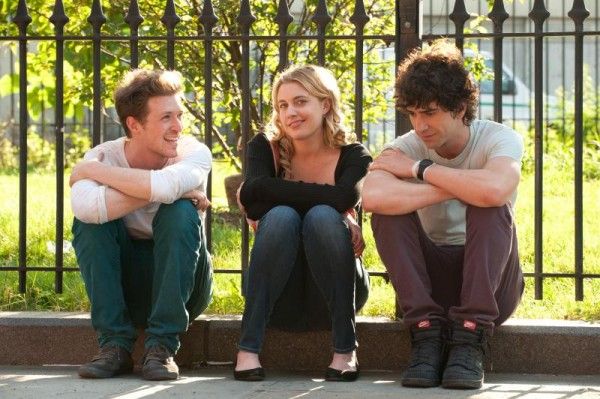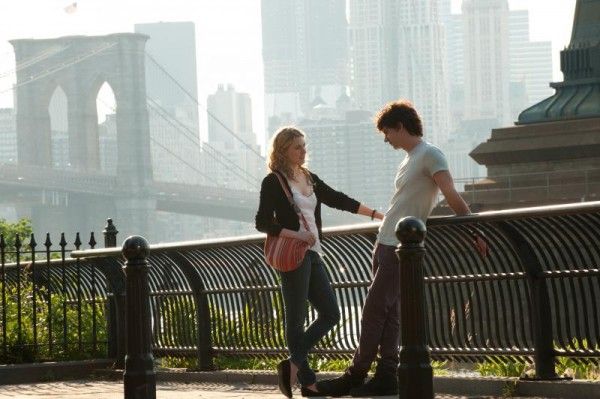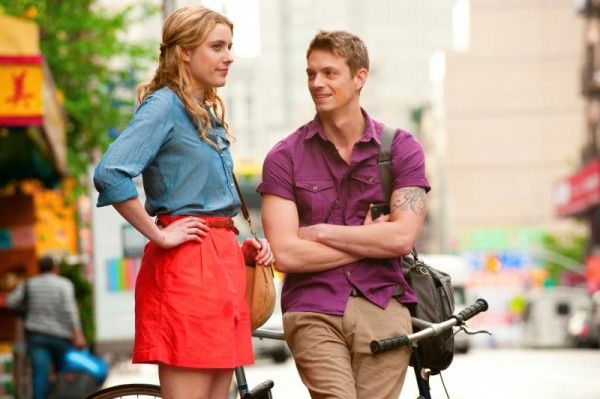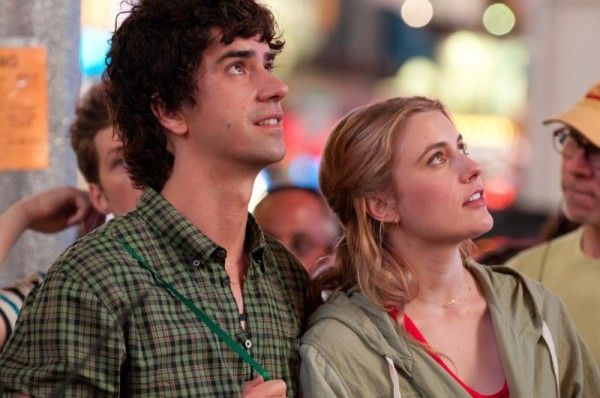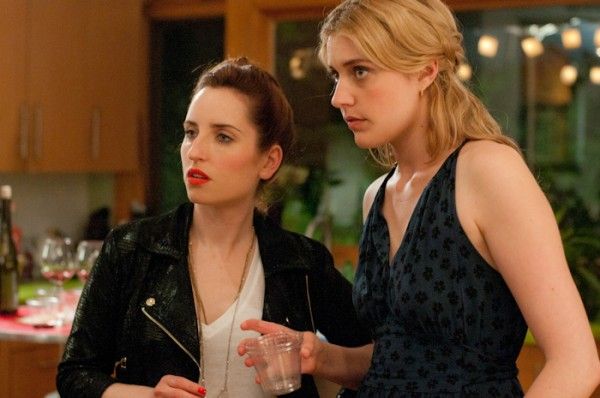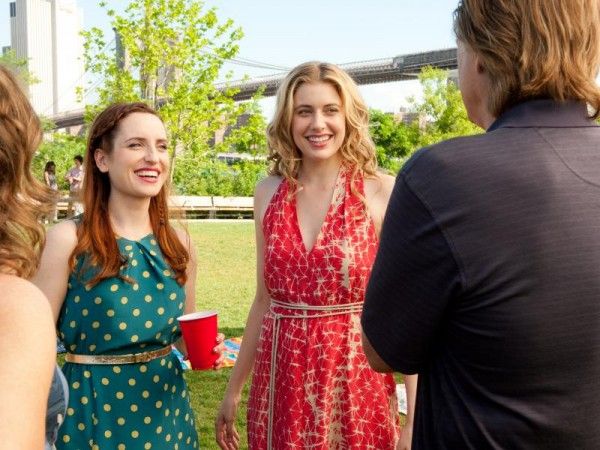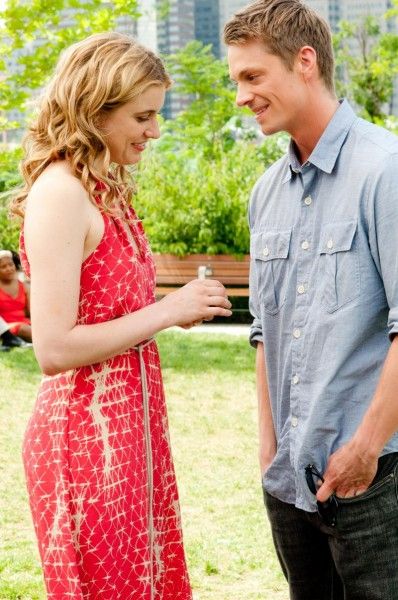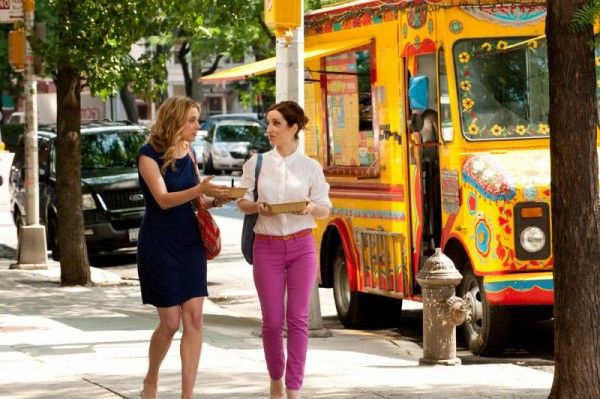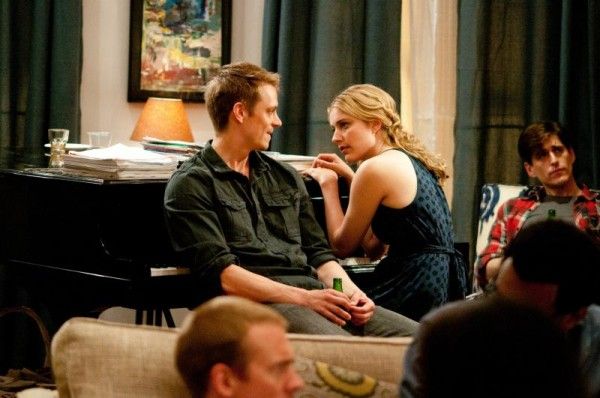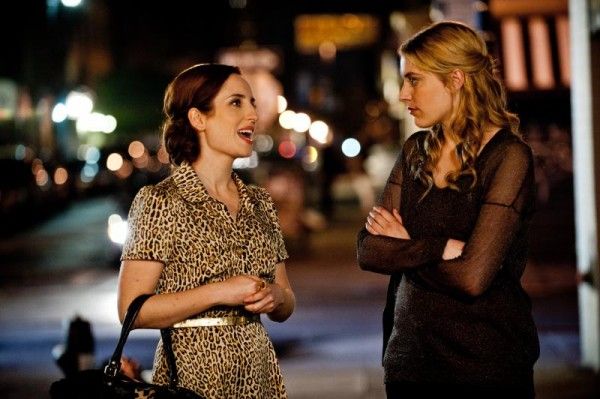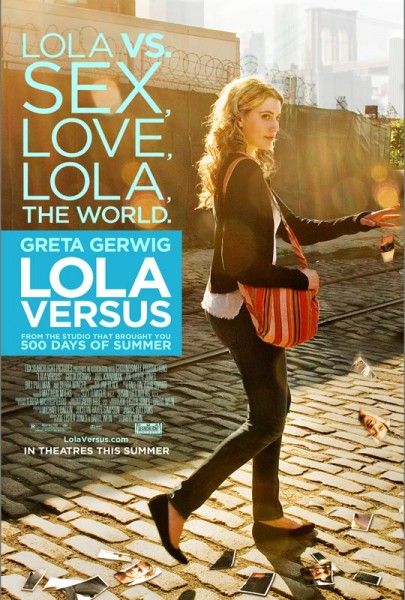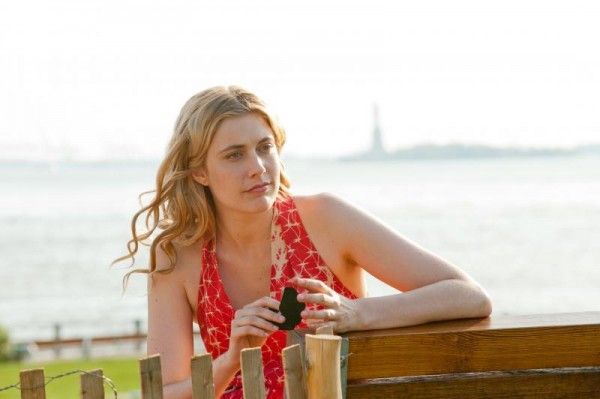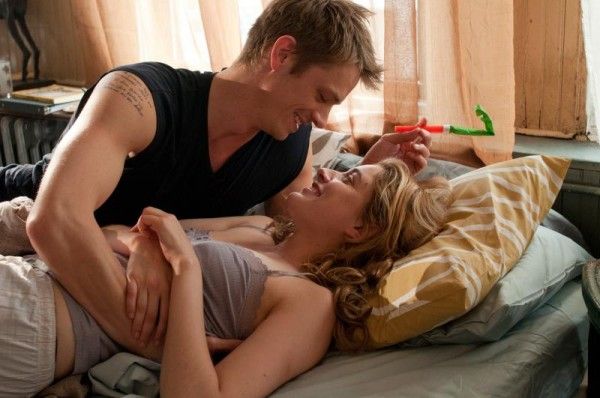To create a poignant and funny portrait of creative young New Yorkers trying to make their mark in Manhattan, writer/director Daryl Wein and co-writer Zoe Lister-Jones looked to their own lives and those of their peers for inspiration. The filmmakers were drawn to the idea of a contemporary romantic comedy with a spirited and authentic woman at its heart that would take the classic boy-meets-girl scenario and turn it on its ear. As Lola Versus begins, Lola’s fiance Luke breaks off their engagement just weeks before the wedding. Over the next 12 months, she slowly, sometimes awkwardly and often comically, adjusts to her new life as a single woman in the city.
We sat down at a roundtable interview with director Daryl Wein to talk about what it was like to write and direct a female-driven movie that tells a story in a fresh and intelligent way. He told us how he set about creating the unique voice and look of the film, how he and DP Jakob Ihre found fresh ways to show off New York City, why he cast Greta Gerwig in the lead role, and why he felt it was important to shoot the film in 35mm. He also discussed his and writing partner Zoe Lister-Jones’ next project tentatively titled Motherfucker.
How autobiographical is this film of your girlfriend Zoe’s life?
WEIN: We co-wrote it. It’s not that autobiographical. I guess it was loosely inspired by Zoe, my girlfriend/co-writer’s experiences as a single woman in the year that we were in an open relationship together when we were making a movie called Breaking Upwards which was our first narrative film together. We were talking about our different experiences at that time after we made Breaking Upwards and trying to come up with what we wanted our next movie to be and realized that there were all these single women that were friends with Zoe who had similar experiences and were struggling to find guys and it seemed like there was this epidemic that was happening. We felt like we really wanted to see a film with a strong, unapologetic female protagonist and felt like we weren’t seeing a lot of post-break-up single female portraits at that age, at 30. So, it was inspired by those discussions.
Can you talk about how you assembled such a terrific cast?
WEIN: We’ve got a great cast. Whenever I’m looking for actors, I’m always looking for actors who are intelligent and who feel fresh and who feel authentic to the world. A lot of our actors are from New York. Hamish Linklater does a lot of New York theater. He’s so off-beat and not the usual guy that you see. He’s not overexposed. He’s charming and charismatic and he seemed to fit that role perfectly. Zoe, my partner, was born and bred in Brooklyn so she’s naturally a perfect fit for the best friend. Debra Winger and Bill Pullman are great established actors and we wanted to round our fresh, more up-and-coming cast with some established actors who we admired. Debra Winger has been in so many great films over the years. I always loved Terms of Endearment.
Bill Pullman is also such an interesting character who also comes from independent roots like Igby Goes Down. They just seemed to fit the mold of these hippie intellectual New York parents really well. Ebon Moss Bachrach, who plays the guy with the big dick, was in my last film, Breaking Upwards, and he’s also an underrated, underused actor who lives in Brookyn. He’s been in a bunch of indie films, but he’s also still not overexposed. They all felt like they fit those criteria for me – being authentic, smart, intelligent and fresh.
This movie seems to be the other side of the coin for Sex and the City.
WEIN: That was one of the reasons we wrote it and wanted to make it. There’s all these broad, glossy, female-driven films like Sex and the City, Bridget Jones’s Diary and Bridesmaids which are all funny, but we wanted to do something that felt a little bit more grounded and authentic to our reality, that we felt real women could related to. It’s not that I don’t like Sex and the City. I think it’s really fun and glamourous, but in those films and most female-driven films, you’re usually rooting for the guy to be with the girl in the end and it’s usually wrapped up with a bow, and this is kind of the anti-Sex and the City in that way. You’re not rooting for them to be together. You’re really rooting for her to be okay with being alone, with being by herself.
Why did you put her in high heels just to be falling at the end?
WEIN: The heel metaphor was something that we were connecting from the beginning of the film when there’s the dream and all the heels wash up. In her subconscious, there’s all this noise and clutter that’s buried beneath the surface, and the heels in that dream are meant to symbolize her issues with her own self-image. She wants to be the woman who can wear the high heels, but she’s messy and she doesn’t feel comfortable yet in doing that. And then, when she has a conversation later in the movie, where she’s talking to her mom, there’s that metaphor about Cinderella and how every woman is waiting for their Prince Charming to slide the silver slipper on, the glass slipper, that proverbial shoe. She’s trying to be this new woman. And so, at the end of the film when she puts on that heel and she’s walking down the street and she falls, for me at least and anyone can interprets it however they want, she’s not quite there yet. She’s still figuring it out, but she gets up and she walks off hopefully. It’s to fit in line with the tone, too. It’s just an offbeat moment.
Given the budgetary constraints, why did you elect to shoot in 35mm?
WEIN: I worked really hard to shoot 35 because there’s a big problem happening right now with digital, which is every movie theater is being forced to switch over to digital, and if they don’t, then they’re not necessarily going to be able to show the film. Studios as well are not only enforcing that of theaters, but they’re rapidly switching everything to DCP because I think they think that it’s easier. You just have to send a hard drive. You don’t have to get all these film reels. But there was this article in L.A. Weekly recently which is a really interesting study on the long term effects of digital. Because the digital formats keep changing so rapidly, it might not actually be better because you can put a film print in a cool place and it can sit for one hundred years. So, there are some issues. I feel like so many people are shooting digital but the quality is being lost.
As a filmmaker, I personally don’t think digital is 100% there yet. The Alexa and the Red are very close, but there’s a texture and a richness to the 35 format that’s still incomparable. We worked hard to try and get the budget to accommodate it. We got this amazing DP, who’s more of a European art house DP, to try and again mix up the genre visually so you’re not seeing what you normally expect. Everything is brightly lit and kind of sterile and there’s not a lot of art to the way it’s shot. I just thought it’d make the film more interesting if we were mixing the disciplines while shooting film by having steadicam, by shooting tripod and some of it we shoot hand-held. But it’s also specific to what’s happening in the scenes.
What did you specifically like about Greta who’s quirky and not the usual type of leading lady?
WEIN: Exactly. You just said it right there. She’s not the obvious sparkly leading lady choice. She’s not the typical Julia Roberts or Sarah Jessica Parker. She has a more enigmatic -- you almost can’t put your finger on it -- naturalism. It’s nice to feel like she’s real. Greta has this very understated quality which is what seemed right for this character. Also, because Lola is post-break-up in the majority of the film and she’s spiraling out of control, that quality seemed to lend itself perfectly to that, because when you’re speaking very articulately and you’re poised and you hold yourself well, that to me seems to indicate a certain way of being in life. You’re in a certain place. And, whenever you break up with someone of many years, you tend to go down spiraling out of control, down some rabbit hole of sorts.
I mean, everyone has their own version of it, but her qualities as an actor seemed to complement that journey really well. She’s not able to make all the right decisions. Sometimes she’s inarticulate. Sometimes she puts her foot in her mouth. Sometimes she’s irrational and erratic. She’s not always the sparkly, clean ingenue that you typically think of who’s always the victim. She’s alienating people and making mistakes, too.
Was there ever any question that Zoe would play Alice?
WEIN: When we originally wrote it, we were thinking Zoe would be Lola because we didn’t know that we would be able to get a big production with producers and a studio on board. We come from very independent roots. Breaking Upwards, the last movie that I made, was only for $15,000. We were thinking we would probably just have to make another low budget film. But luckily, people in Hollywood really responded to the script. That’s how we got Michael London, who’s such a great producer, and the amazing Fox Searchlight on board. At that point, everything changed. Unfortunately, Zoe is not a bankable, financeable enough star yet to be able to be playing the leading role so we made her the best friend.
The role seems tailor made for her.
WEIN: It helps when you’re writing it. It’s easier for her because she’s speaking the words that we wrote.
As a director, when you were shooting your first big budget production, did you feel pressure to do it well and were you given the freedom to do what you wanted to?
WEIN: There’s definitely an added pressure. Not only do I have a 65-person crew, I have the studio and the producers who all have this vested interest in me, and so, the stakes are that much higher. Whereas, when we were making Breaking Upwards, and I had three crew members that we found on Craigslist, and my good friend was the DP, we just walked outside our house and shot on the street. There was no one around us. No one even cared that we were shooting. So it was much different circumstances. But when you have a big support system, you can bounce your ideas off of them and they challenge you to be the best that you can be. In that respect, it’s really an amazing experience to have all those people.
What does it say about the differences between men and women’s approach, attitudes and response to sex? Is there actually a difference?
WEIN: There is a difference. I think women become more wrapped up emotionally in men when sex is involved. And I think men have a much easier time of having innocuous, meaningless sex for pleasure. It’s just how we’re built genetically. It’s just in men’s DNA to want to have sex. I think those generalizations, at least in my experience, have proven to be pretty true.
There’s a great line in the movie about relationships where one of the characters says “The men always want something better and the women want to make it work.”
WEIN: “Men are always looking for what’s better and women are just looking for what works,” I think. It’s something like that. We all have different feelings about these things, and I can’t speak for all men. But, in this film particularly, obviously we’re showing a man who’s frustrated and breaking up with this woman after 8 years together, and she has the rug pulled out from under her and so she is forced to go back out on the dating scene. Maybe it’s a little harder for a woman who is 30 than it is for a man. I think a lot of women – and I do speak also on behalf of Zoe, my girlfriend, and her experiences and the other women that I’ve talked to – I think there is a panic because we all are conditioned to be settled down at 30 and have a job. Women are thinking “Well, when am I having children?” I mean, there is a biological clock which is why we had that scene about freezing the eggs. There are things that you’re thinking about as a woman. We were trying, as we were writing it, to hit those universal themes and issues that it seems like all women are going through.
One of the things I liked about it is that it’s very nuanced and Luke leaves her but then he wants her back.
WEIN: That’s right. It’s always a push and pull. It’s all power politics. When you’re in power, you’re not thinking about the consequences as much because they’re so needy. Your partner is so needy and coming after you. They’re giving you all the attention so you feel like you’re sitting on the high horse, but then the second they stop returning your calls or they’re off doing their own thing, or Lola starts dating Henry, Luke’s best friend, all of a sudden, you’re like “Whoa! I didn’t think she was going to go do that.” You start to freak out. Once they break up, it takes a while for a couple to be secure and be independent because you become so co-dependent when you’re in a long term relationship, whether you think you are or not. Even if you do have days on or off, you have off days. You go off to be with your guy friends and the girls go off to be with their girlfriends. You are very much entwined, texting, calling. You’re always aware where the other person is. It’s a much different feeling when you’re single and you’re not thinking about anyone else. You’re just thinking about yourself. There’s no coming home at a certain time or caring about someone else’s feelings. You become very co-dependent.
Could you talk about shooting in New York and the unusual locations you chose? Was the plan to shoot in New York from the beginning?
WEIN: The plan was always to shoot in New York. Jakob Ihre, who is our lovely Swedish DP, and I worked the whole month and a half before [filming started] trying to figure out how we wanted to shoot it and show a few different sides to New York. It’s very hard to do because obviously millions of movies have been shot there and people tend to shoot the same areas. We were like okay, well where do people not usually shoot and what would be appropriate for the story? We went into Dumbo (acronym for Down Under the Manhattan Bridge Overpass) in Brooklyn and into an area called Vinegar Hill, which is where they’re looking for the Neil Sedaka house and they have that whole running-under-the-bridge montage. It was a really unique place to be, all the way over near the Navy Yard. And we shot on the High Line which was really exciting. I think we were one of the first films to shoot on the High Line. Russ & Daughters, the fish shop, that’s been there for 100 years, we were the first film to ever shoot in there which is really cool. That’s where I buy my smoked salmon and babka in real life, so I was dying to shoot in there because it’s such a cinematic and authentic New York establishment. I can’t believe we beat Woody Allen to that location. We were trying to find some fresh ways to show off the city. We were a low budget film in the grand scheme of studio films. To go and shoot in the middle of Times Square with a little skeleton unit was really difficult, but I think it adds to the scope and feel of the story in the end. I think we shot double the typical locations for our budget size and that made it so we were shooting more pages per day. It just made it harder for the actors because obviously it’s a very talky movie.
Shooting in New York is tough because it’s so congested. All of a sudden, I was going from wheeling a trunk with our gear for Breaking Upwards to massive trucks and cables taking up blocks. It was such a different production. All of a sudden to have all these people take over city streets, you move slower in that way. I’m so used to just running and gunning and being more gorilla, but it was gorilla in a new context, so it’s all relative.
How will this experience change your future directorial efforts?
WEIN: We’ll have to wait and see. I don’t know. I think people are looking to me a little bit as a relationship oriented kind of director because Breaking Upwards and Lola Versus now focus so much on intimate, co-dependent relationships in New York. People are like “Are you trying to be like the new Woody Allen?” I love Woody Allen. Obviously, a lot of his films like Annie Hall, Manhattan, and Husbands and Wives have been big influences on me, but for me I’m just looking at whatever moment I’m at, trying to tell a story that at that time feels like it needs to be told, like I want to see it and how I’m feeling in my life. Two and a half years ago, when we started writing this, we felt like there needed to be a movie with a strong female lead because we felt like we weren’t seeing portraits of single women.
Will a big check change all of that?
WEIN: A big check? If I get a big check, will I go do a big romantic comedy? How big can you go? No. Look, I’m not interested in selling out my career for a big paycheck. I would love to live a little more comfortably, but it is very important for me to try and maintain my soul and integrity as a filmmaker in as big of a way as possible. So, if I am able to make another romantic comedy – which I wouldn’t call this a romantic comedy, I’d call it more a relationship dramedy or drama-comedy – maybe it would be fun to go and shoot in all these different countries around the world. But I don’t want to just make relationship movies. I would love to do whatever feels like it’s important and timely and needs to be told. It doesn’t matter what genre. It doesn’t have to just be relationships. I really have a passion to make a movie about what’s happening with food right now. I have this idea to do a thriller about genetically modified food and Monsanto and how the big biotechnology agricultural corporations are changing the way we eat, even though people don’t really know it.
Did you watch HBO’s documentary about that?
WEIN: I did. I’ve seen all of the documentaries like The World According to Monsanto and stuff, plus that would be a totally different genre to go into, but that to me seems like a story that would be an important story to tell right now. That’s a little bit more political, but those are the stories that I’m interested in.
What you are working on next?
WEIN: We have another script with Fox Searchlight that we’re writing that is a kind of updated reversal on The Graduate. It’s not trying to be based on The Graduate, but it’s about a guy who falls in love with his girlfriend’s mother and it’s kind of a May-December romance film. But, whereas in The Graduate it was all about the sex that they were having together, this isn’t about that. It’s more about can an older woman and a younger man make it work. They have an emotional connection with each other, kind of a soulmate connection, which is obviously a very taboo thing to have in this society and in the way that we all view relationships in obviously a very puritanical way. And I guess that makes sense because I’m interested in exploring these alternative relationship stories.
What’s it called?
WEIN: I don’t know how you’re going to respond to this. It’s tentatively called Motherfucker.
Do you have a cast in mind?
WEIN: Not yet. We’re just writing it.
What do you think it is that’s made you and Zoe such a successful young writer-director team? Is it your drive?
WEIN: It’s called OCD. I don’t know. It’s what I love to do and I am a little bit obsessive about what I love to do. I think I just have this crazy drive to want to do it. Sometimes, to my detriment, I’m in bed at like two in the morning writing ideas down or something and Zoe goes “Can’t we just please go to sleep and stop talking about the script?” It’s so hard when you’re an artist. Your personal life and your professional life kind of blend together. I’m writing from home so I don’t have an office or anything. I don’t know where to draw the line between “Okay, let’s stop now and watch American Idol” which has it’s season finale tonight. Unfortunately, I have a screening tonight so I can’t go to the finale. But you have to hustle. Coming from an independent film background, everyone wants to be in this industry as an actor or a filmmaker. I realized when I graduated from NYU -- which I didn’t go to school for film, I just did film on the side because I loved it -- that I learned everything from just making stuff. I learned very quickly that if you just go out and make something and maybe fail at it or you just learn how to edit it yourself. I edited my last few films. You just do it yourself. You feel so creatively empowered and you’re controlling your own destiny as artists.
I just decided with Breaking Upwards, before Lola, we’ll not wait years to try and get someone to believe in us for the first time and we’ll just go out and we’ll figure out how to produce it on the way. Zoe and I produced it. We formed an LLC. We called up SAG and said “We want to use SAG actors,” and they were like “Alright, here are the contracts you need to follow.” We read through the contracts. We realized we needed to get Workers’ Comp Insurance and Disability Insurance, and we figured it out as we went along just by doing it. I think a lot of young filmmakers just need sometimes to be confident enough in their vision and their projects to want to just do it. I think if you’re ambitious and determined enough, you can. You can do it.
Lola Versus is now playing in limited release.


